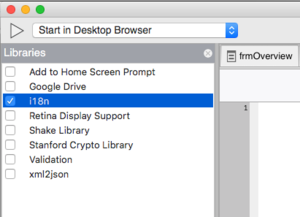Internationalization (i18n)
Internationalization (often shortened to i18n) allows your app to run in multiple languages. For example, the user could choose to work in English, French, German, Spanish or Italian. Any number of languages can be used.
The translations are driven by a table file containing the default language and the translation. Here is a sample table for German, with the default language being English:
{
"Monday": "Montag",
"Tuesday": "Dienstag",
"Wednesday": "Mittwoch",
"Thursday": "Donnerstag",
"Friday": "Freitag",
"Saturday": "Samstag",
"Sunday": "Sontag",
"Day": "Tag"
}
This information should be saved in a file called de.json, saved in a folder named i18n in your project folder. The two letter code 'de' is the international standard code for the language.
To enable i18n in your project, select i18n in the Libraries panel:

Common and Bootstrap 4 controls already have i18n enabled - nothing further needs to be done.
Assignments to controls at runtime need to call the i18n function as follows: ``` Input1.placeholder = $.i18n("Enter text here") ``` It's safe to do this with any string: if there is no entry in the translation table, the value is unchanged.
Setting the Language
When your app starts for the first time, the default language is used. If the language is changed, the setting is remembered next time the app is started.
Here's how to change the language:
NSB.initLanguage(locale).then(cleanup)
- locale is the two letter language code to be set to.
- cleanup is a function which gets called once the language change is complete. Use this to update any fields which do not change automatically.